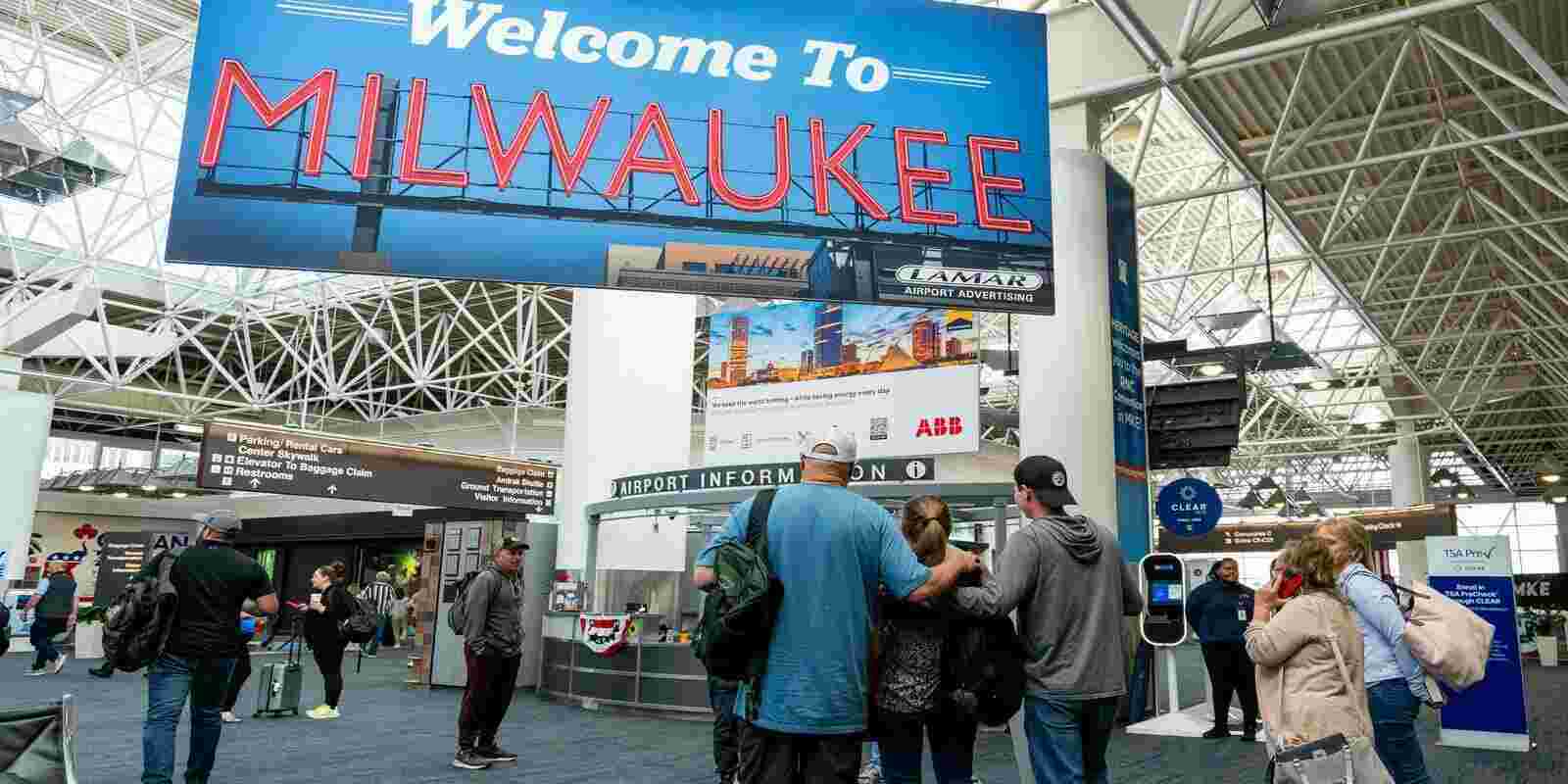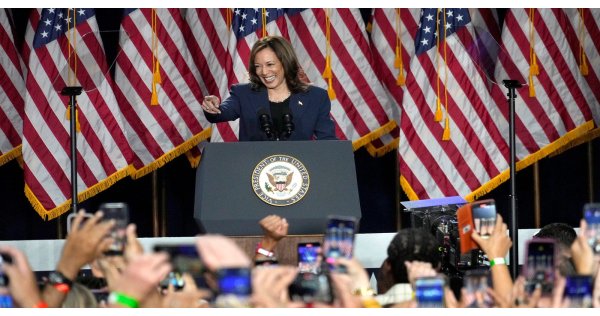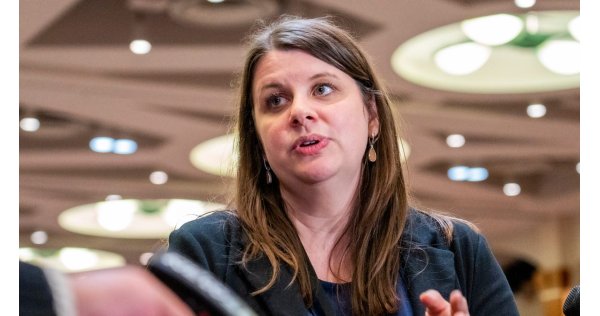POLITICS
Milwaukee RNC: A Historic Fusion of Hospitality, Politics, and Law Enforcement
*By Alison Dirr, Tom Daykin, Ricardo Torres, David Clarey, Sophie Carson - Milwaukee Journal Sentinel*
Over the course of four days, Milwaukee, typically a deep blue city, transformed into a vivid red hub as it hosted the Republican National Convention (RNC). The downtown area, enclosed within strict credentialed zones, was alive with red MAGA hats, crimson attire, and festive decorations. Fiserv Forum served as the main stage for this widely televised event, which took on added weight following a recent assassination attempt on former President Donald Trump, just days before he was formally nominated for a second presidential term.
The RNC distributed around 50,000 credentials for the convention, which ran from Monday to Thursday across Fiserv Forum, the UW-Milwaukee Panther Arena, and the Baird Center, according to an RNC spokesperson. Surrounding the secured area, tall black fences and concrete barriers transformed parts of downtown into a complex maze, with public transit routes modified to avoid the restricted zones. Vulnerable community members, such as the homeless, faced added difficulties accessing food pantries and essential services.
Some local businesses flourished during the event, while others anticipated a larger influx of visitors than what materialized. Encounters of political peculiarity punctuated the convention, like the unusual sight of a woman dressed as a hefty baby Trump mingling near an individual displaying an anti-abortion sign. Additionally, a nearly 400-page compendium titled "Collected Poems of Donald J. Trump," derived from the former president's social media posts, was available for purchase.
Protests, including the largest organized event planned for the convention's first day, occurred without significant incident. While many activists stayed away from designated protest areas, tensions did arise around vocal protesters arguing with each other outside security checkpoints.
A significant police presence, consisting of officers from across the nation, patrolled not only near the convention but throughout the city. A tragic incident unfolded when Ohio police fatally shot a homeless man wielding knives in King Park, raising concerns about the public statements made by the Milwaukee Police Department prior to the event. In response, local police increased their representation in all bicycle units involved in security operations.
Reflecting on the unprecedented nature of the event, Milwaukee’s Democratic Mayor Cavalier Johnson remarked, "Unprecedented" is how he described the week, adding, "We had never hosted something so large here before. It was a massive event that... involved hospitality, politics, and law enforcement. Across every aspect, I think everyone delivered a herculean effort." He noted that many visitors expressed that "Milwaukee shined" throughout the week.
Visitors Discover Milwaukee's Charm During the RNC
As city leaders embraced the RNC as an opportunity to showcase Milwaukee, the convention organizers aimed to energize delegates and voters ahead of the crucial November elections. For at least one delegate, the event changed preconceived notions; AK Kamara from Minnesota had previously heard negative remarks about Milwaukee but found it to be a "beautiful city."
Kamara's packed schedule revolved around networking and learning effective campaigning strategies. He explored local destinations but noted that the security perimeter limited his ability to fully experience the city due to street closures.
First-time visitor Anna Bryson, an alternate delegate from California, marveled at the scenic views of Lake Michigan, exclaiming, "This is so beautiful, and I never knew."
Jessica Patterson, chair of the California GOP, praised the warm welcome her delegation received, highlighting the excellent cooperation from local venues and hotels.
Mixed Economic Outcomes for Local Businesses During the RNC
Ahead of the RNC, Milwaukee officials primarily justified bringing the Republican convention to their heavily Democratic city based on economic benefits, both immediate and future. While some businesses saw increased patronage from the influx of convention-goers, others were less fortunate.
In the Third Ward, a quieter than usual atmosphere prevailed on a Wednesday evening, with many parking spots available and fewer visitors than expected enjoying the live music and refreshments. Karen Bell from Bavette La Boucherie noted that while her business picked up towards the end of the week, many regular lunch patrons were absent due to remote work.
Paul Schwartz, executive director of the Milwaukee Public Market, observed improved business activity on Wednesday and Thursday compared to the earlier days, noting increased traffic at certain restaurants. However, disruptions from the security perimeter nearby also affected easier access for potential customers.
John Vassallo, the owner of Mo's ... A Place for Steaks and Mo's Irish Pub, reported that hosting special events helped boost business in their establishments near the corner of West Wisconsin and North Plankinton avenues.
While some businesses managed to attract significant crowds, others were impacted by the convention's accompanying challenges, including difficulties with pedestrian accessibility due to strict security and street closures. Peggy Williams-Smith, president and CEO of Visit Milwaukee, remarked that although not every restaurant's business surged, the week's overall economic impact remained considerable, generating valuable exposure for Milwaukee as a travel destination.
RNC Host Committee chairman Reince Priebus emphasized that the convention served as a "test run" for future high-profile events, predicting that with lessons learned from the RNC, Milwaukee would be positioned to host more significant gatherings without the extensive security measures in place.
Issues and Scrutiny Surrounding Safety During the RNC
The first day of the convention quickly turned somber as officers from Columbus, Ohio, shot and killed Samuel Sharpe Jr., a man armed with knives, leading to scrutiny of the public safety plan in place during the event. This incident raised concerns among local activists about the potential implications of sending large numbers of out-of-state officers to the city.
Despite this, a range of minor incidents occurred over the week, including an arrest near the venue involving an individual carrying a concealed weapon. Fortunately, the major protests expected did not materialize, and the city’s police and fire departments generally reported a successful operation.
The weeklong event also placed Milwaukee in the national spotlight, emphasizing its potential as a host for future gatherings while also establishing a platform for community voices on critical political issues.
As discussions of economic impacts, safety concerns, and the political climate played out, the general consensus among city officials appeared to recognize the convention as an opportunity for growth and exposure on the national stage.
*This article includes contributions from Journal Sentinel staff members.*
*Alison Dirr can be reached at adirr@jrn.com.*
Milwaukee RNC an 'unprecedented' moment combining hospitality, politics and police
"It was part hospitality, part politics, a big part law enforcement. ... In all those spaces overall, I think that everybody delivered," mayor says.



